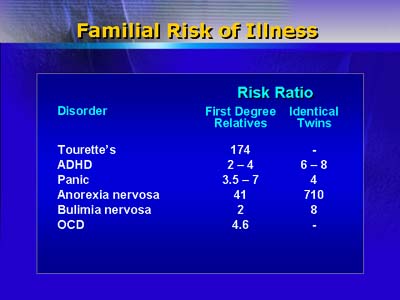Dr. Hyman believes that substantial genetic components are well documented in serious psychiatric disorders, such as schizophrenia, bipolar disorder, and autism. The genetic component in those disorders has been reported stronger than that in some non-psychiatric disorders, such as type II diabetes and cardiovascular disease. He endorses intensive study of genetically influenced psychiatric disorders in order to provide pathophysiologically valid targets for drug development.
Dr. Hyman cites Alzheimer's disease as an example of how genomic studies can promote development of new treatment strategies. The discovery of rare families in which Alzheimer's disease is transmitted in Mendelian fashion led to identification of three genes in which mutations can cause the disease. The finding that all three mutations cause accumulation of a toxic peptide led to investigation of the amyloid precursor that forms the toxic peptide. Genetic findings also permitted creation of mutagenic mouse models involving the human mutations. This in turn has allowed development of promising treatments, including a possible immunization treatment.
Pointing out that Alzheimer's disease has a known neuropathology that constitutes an independent variable for diagnosis (albeit postmortem), Dr. Hyman notes that no such features exist for schizophrenia, bipolar disorder, autism, anxiety disorders, or depression. Thus, the issue of phenotypes comes into play and introduces enormous difficulties. The current diagnostic system in psychiatry consists of DSM and ICD guides. While these guides represent reasonable consensus about behavioral characteristics and predictors of outcomes, the expert consensus they reflect is not empirical validation. Accordingly, psychiatric diagnoses may differ from biologically valid phenotypes and have potential to be misleading in genomic studies.

Genotypes, too, pose a challenge in genetic studies of psychiatric disorders, according to Dr. Hyman. The key in Alzheimer's disease research was the discovery of a form inherited in Mendelian fashion. In contrast, psychiatric disorders appear genetically complex: No single gene is either necessary or sufficient to cause them. Instead, they appear to result from interactions of many genes with many non-genetic factors. There are multiple genetic pathways to illness. Moreover, in psychiatric disorders we lack objectively valid markers such as glucose tolerance as a marker for type II diabetes or amyloid plaques as a marker for Alzheimer's disease.
The human genome project has revealed that the human species is very young and that genetic variation from person to person is small. If the common allele hypothesis is correct in stating that common illnesses are caused by common variations in genes, and if there are a finite number of common variants in the human genome, then this bounded set is the place to look for genes that convey risk of psychiatric illnesses.
Dr. Hyman also pointed out that ethical issues are important in the current, post-genomic era. There is appropriate concern about misuse of genetic information by insurance companies, employers, governments, and others. This is particularly important for psychiatric disorders because information will be probabilistic, rather than deterministic. The psychiatric disorders are not genetically like Huntington's disease. Genetic information should be private.